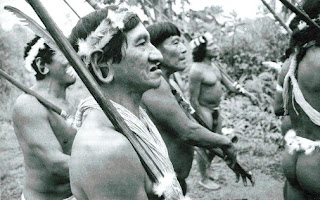The lives of isolated indigenous people, the most vulnerable within a historically sensitive and abandoned region, have come back to life in the Ecuadorian and world imagination only through their deaths.
Is it possible that as an organized society we can face these situations and avoid their extinction?
We strongly affirm that it is possible to do so by taking concrete, realistic and feasible measures:
– The immediate removal of the oil companies’ power generators and their replacement with cables and relocation to a suitable distance from the territory of the isolated people. The use of these generators in sensitive areas is merely a reflection of the cost-cutting carried out by these companies to the detriment of the environment and its inhabitants, in this case the isolated indigenous people, since their noise scares away game and, therefore, their food. The lack of sustenance is one of the reasons that make these nomadic peoples move to other territories, entering into conflict with inhabitants of other areas.
– Implement a moratorium on the granting of licenses for new oil activities (exploration, seismic, wells, etc.), for deforestation, or for any infrastructure work.
– Stop titling land in areas of influence of isolated indigenous peoples, as this implies an incentive for the advancement of a serious change in land use, directly affecting the ecosystem of these peoples.
– The need to consider plans for the withdrawal of external activities (crops, housing, hunting areas), once the previous proposals have been resolved.
– Intervention is essential to improve the living conditions of the local population. In this sense, one of the keys is the creation of economic alternatives aimed at minimizing activities such as illegal logging and the expansion of the agricultural frontier.
It is urgent for everyone, civil society, social organizations, non-governmental organizations and the State, to ask themselves, honestly, why these five proposals are or are not appropriate.
In order to come up with any solution, it is essential not to overlook Human Rights – Individual and Collective – nor all their implementation through different tools, guidelines, regulations, standards and plans – national and international – already existing for the protection of Indigenous Peoples in Situation of Isolation. It is also essential to have in the collective imagination both the Right to Self-Determination (isolation is their choice and forced contact would violate this right), as well as the Right to Territory (key to sustaining life).
It is also imperative that we establish an open and responsible debate about what happened: we call on Ecuadorian society to assume it in all its complexity in order to try to resolve the conflict, something that will probably happen in the medium-long term but that must be taken into account, responsibly, from this very moment, before survival, contradictorily, continues to turn into death.
Isolated indigenous peoples have been and continue to be deprived of their territory. We demand the right that isolated peoples not also be deprived of their right to live in isolation, nor of the only thing they have left: their right to life.
We are not Waorani. Nor are we isolated indigenous people. But all these deaths that have been happening and will continue to happen if responsibilities are not assumed, are killing us too.
![]()

